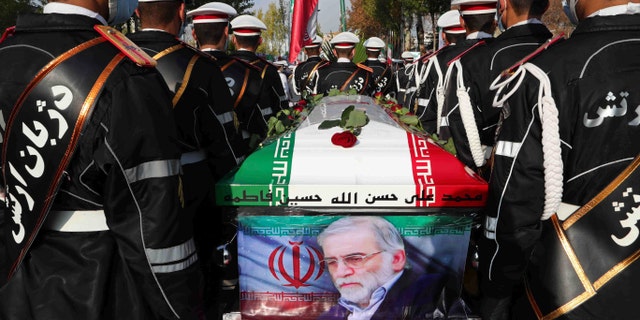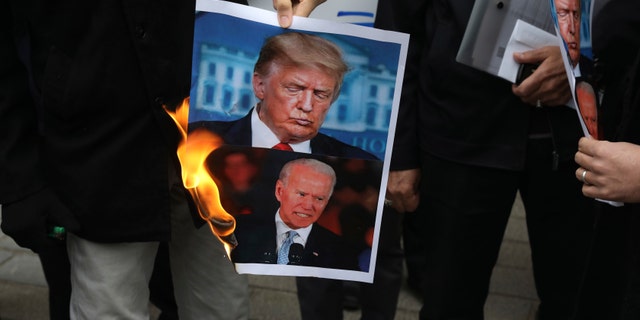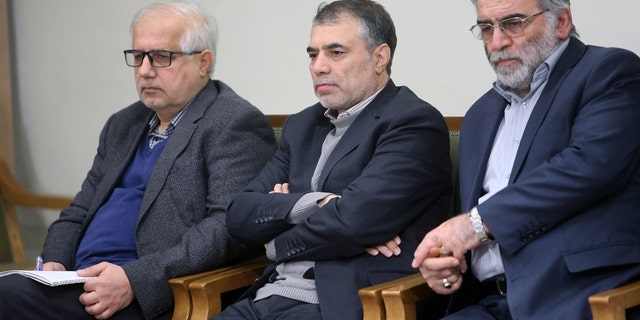Home » World News »
What he knew: Why Iranian nuclear scientist Mohsen Fakhrizadeh was marked for death
Iran’s leader threatens retaliation over killing of top nuclear scientist
Officials in Iran are plotting its response after scientist Mohsen Fakhrizadeh was killed. Trey Yingst reports.
Mohsen Fakhrizadeh, 59, was dubbed everything from Iran's “shadow man” and the “father” of its forthcoming bomb to Tehran’s weapons guru and the “pervasive thread” to the beleaguered nation’s nuclear aspirations.
The scientist’s assassination on the edges of the Iranian capital on Friday – presumed to have been carried out by Israeli operatives – has propelled him from obscurity into the global spotlight, along with these questions: who was Fakhrizadeh, who lived in a secure compound, had round-the-clock security and was clearly of high value to the regime, and why was he marked for dead?
“Mohsen Fakhrizadeh was the director of Iran’s military nuclear program. The program’s objective is reducing the size of Iran’s nuclear warheads in order to fit them to long-range cruise missiles that have the range capabilities of reaching as far as Europe,” Sarit Zehavi, CEO and founder of the Israel-based, geopolitical analysis firm Alma Research and Education Center, told Fox News. “Fakhrizadeh was under Israeli intelligence service surveillance for many years.”
KILLING OF IRANIAN NUCLEAR SCIENTIST HAS REGION, WORLD LEADERS ON EDGE OVER POTENTIAL RETALIATION FROM IRAN

In this photo released by the official website of the Iranian Defense Ministry, military personnel stand near the flag-draped coffin of Mohsen Fakhrizadeh, a scientist who was killed on Friday, during a funeral ceremony in Tehran, Iran, Monday, Nov. 30, 2020. Fakhrizadeh founded Iran’s military nuclear program two decades ago, and the Islamic Republic’s defense minister vowed to continue the man’s work "with more speed and more power." (Iranian Defense Ministry via AP)
Despite being on the intelligence community's radar, it wasn’t until a televised speech by Israeli Prime Minister Benjamin Netanyahu in 2018 – centered on exposing internal Iranian nuclear documents – that Fakhrizadeh’s photo flashed broadly across public screens for the first time.
“Remember his name,” Netanyahu encouraged, identifying Fakhrizadeh as head of the covert AMAD Project – which was tasked by the regime with developing nuclear weapons – a role he is said to have held since 1998.
Born in the holy city of Qom, Fakhrizadeh joined the Islamic Revolutionary Guard Corps in 1979, shortly after the Iranian revolution, and went on to earn multiple degrees, including a Ph.D. in nuclear radiation and cosmic rays from the University of Isfahan, before rapidly rising in the ranks.
Under pressure from much of the international community and Western officials, the AMAD Project was officially shuttered in 2003. Yet Fakhrizadeh, according to multiple intelligence officials, was pivotal in devising Iran’s uranium enrichment capabilities and was suspected of continuing research and supervising other scientists in the AMAD fold.
BIDEN WILL TRY TO REVITALIZE 'SMOKE AND MIRRORS' IRAN DEAL: KT MCFARLAND
Those concerns were underscored in a 2011 International Atomic Energy Agency (IAEA) document that identified Fakhrizadeh as a fundamental figure in potential Iranian work to develop technology and skills required for atomic bombs. The assessment said he had also quietly opened and led the Organization of Defensive Innovation and Research (SPND) in the Tehran suburb of Mojdeh that year, raising further red flags.
And while the 2018 documents allegedly smuggled out of Iran by Israel intelligence almost three years ago reinforced his pivotal position in the nuclear arena, sights had long been set on him.
But unlike several other AMAD-connected scientists, who Tehran permitted the IAEA to interview for their reports and inspections, the leadership refused to make Fakhrizadeh available. Subsequently, in late 2006, he was sanctioned by the U.N. Security Council – subjected to a travel notification and asset freeze.

A group of protesters burn pictures of the U.S. President Donald Trump, top, and the President-elect Joe Biden in a gathering in front of Iranian Foreign Ministry on Saturday, Nov. 28, 2020, a day after the killing of Mohsen Fakhrizadeh an Iranian scientist linked to the country’s nuclear program by unknown assailants near Tehran. (AP Photo/Vahid Salemi)
A 2007 U.N. Security Council resolution further identified him as a “senior scientist in the Ministry of Defence and Armed Forces Logistics and the former head of the Physics Research Center (PHRC) at Lavizan-Shian.” That same year, President George W. Bush unveiled an intelligence report that contained references to Fakhrizadeh being told to halt the nuclear program in compliance with the 2003 orders.
He was again mentioned briefly in an IAEA report the following year, and at the same time, the U.S. government ordered Fakhrizadeh’s assets frozen, along with seven other Iranian nationals linked to “nuclear or ballistic missile” groundwork.
“Fakhrizadeh was at the apex of their nuclear weapons research and (given his still young age) he could have provided leadership to the project, especially with regards to miniaturization and ruggedization of nukes, to merge nuclear and missile technologies,” said Kamran Bokhari, director of analytical development at the Center for Global Policy. “(These) are critical prerequisites to develop an actual delivery system.”
IRANIAN PARLIAMENT ADVANCES BILL TO STOP UN INSPECTIONS OF NUCLEAR FACILITIES
Moreover, Fakhrizadeh was reported to have visited North Korea in 2013, deepening worries that Iran was using the Hermit Kingdom to advance its studies and conduct indirect testing.
“It is one thing to build a nuclear program, and it is another thing to do it covertly and that is what he (Fakhrizadeh) was doing – and his assassination was delivering a message,” noted Daniel Hoffman, a former CIA station chief. “The message is that if it continues, (key players) would continue to be targeted kinetically. Go ahead and try, but your life is at risk.”
Hoffman also pointed to a “second message” that if Israel indeed was behind the attack; it was their way of highlighting to the incoming Biden administration – which has floated a return to the 2015 nuclear agreement – that they won’t simply stand back while their national security is outsourced.
Following the assassination of other key scientists over the past decade, Tehran authorities are said to have dramatically upped Fakhrizadeh’s security, while at the same time working to keep his name and personal details far from the public eye.
But as Friday’s ambush in broad daylight proves, there are no safe spaces. According to Zehavi, some seven Iranian scientists and officers, all part of Iran’s military nuclear program, have been killed “using similar methods.”
“We assess that every essential figure in Iran’s military nuclear program is in the crosshairs,” she said.
Just months before he was fatally struck down, Fakhrizadeh’s name reemerged in a June 2020 U.S. State Department review, emphasizing that “military research and development” specific to “weaponization-relevant dual-use technical activities” was ongoing at SPND, under Fakhrizadeh’s tutelage.

In this picture released by the official website of the office of the Iranian supreme leader, Mohsen Fakhrizadeh, right, sits in a meeting with Supreme Leader Ayatollah Ali Khamenei in Tehran, Iran, Jan. 23, 2019. Fakhrizadeh, an Iranian scientist that Israel alleged led the Islamic Republic’s military nuclear program until its disbanding in the early 2000s was killed in a targeted attack that saw gunmen use explosives and machine gun fire Friday Nov. 27, 2020, state television said. Two others are unidentified. (Office of the Iranian Supreme Leader via AP)
Yet inside Iran, his name – at least before Friday – was rarely uttered. If it was ever cited by state media, it was to tout his work as a “university professor” and leader in combating the coronavirus pandemic. However, after his slaying in the street, officials characterized Fakhrizadeh as a “martyr.”
CLICK HERE TO GET THE FOX NEWS APP
What Fakhrizadeh knew and his value to the Islamic Republic remains subject to debate, but the broad consensus is that his death will stymie but not stop Iran's pursuit of nuclear weapons.
“Fakhrizadeh’s death will cause delays for Iran’s military nuclear program, the management, coordination, and acquisitions of the military program’s components all being performed by him. Hence, he was not just another nuclear scientist like the four others who were killed just a few years ago, but rather a dominant and centralized figure in Iran’s military nuclear program,” Zehavi said. “So, in our assessment, the Iranians will have a difficult time acquiring Fakhrizadeh’s lost administrative knowledge.”
Source: Read Full Article



